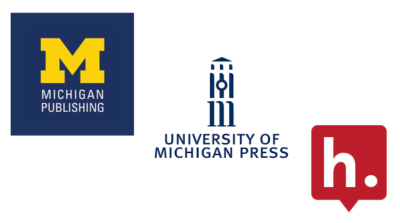Michigan Publishing to Integrate Hypothesis Annotation with Fulcrum
 Michigan Publishing (MP), including University of Michigan Press (UMP), is pleased to announce a collaboration with Hypothesis to bring annotation to the new ebook platform Fulcrum, scheduled for a January 2019 public release.
Michigan Publishing (MP), including University of Michigan Press (UMP), is pleased to announce a collaboration with Hypothesis to bring annotation to the new ebook platform Fulcrum, scheduled for a January 2019 public release.
Having experimented with annotation on their DigitalCultureBooks imprint in 2015 and, having hosted a number of community events around annotation, MP is now ready for a more extensive partnership to give authors a way to update their works, link to other sites or content of related interest, and interact with their readers.
In February 2017, the W3C standards body for the web approved annotation as a web standard creating a foundation upon which a future interoperable network of annotation clients can be built. Founder of the Annotating All Knowledge Coalition — now more than 75 members strong — Hypothesis is committed to supporting the ecosystem around standards-based, interoperable annotation. UMP, a charter member of the AAKC, was an early proponent of this technology.
“Fulcrum is dedicated to providing a uniquely rich user experience for scholars in the humanities and qualitative social sciences as a platform based on open standards,” said Charles Watkinson, Associate University Librarian, University of Michigan Library, and Director, University of Michigan Press. “Hypothesis is becoming the annotation choice for the experts we are working with and Michigan is excited to be able to expand on our long support.”
Launched earlier this year, Hypothesis Open and Restricted Groups enable publishers to determine precisely who will be able to read and create annotations, all in a branded and moderated setting. Both types of groups are visible by default to anyone reading content on the publisher site. Anyone can participate in an Open Group, simply by creating an account, which they will subsequently be able to use on any content anywhere across the web on formats including HTML, PDF, and EPUB. Restricted groups are designated by the publisher for specific purposes, such as author updates, invited expert annotations, or the addition of information by the editorial team. Each group has a group activity page where annotations can be discovered and explored in context. Publishers receive extensive metrics on activity in groups.
“As Michigan Publishing was one of the first publishers to experiment on annotation of book content, it’s only fitting that they lead in the deployment of annotation layers across books on the Fulcrum platform,” notes Heather Staines, Director of Partnerships for Hypothesis. “We’re thrilled to see Fulcrum launch in the open platform space, opening up new possibilities for book publishers.”
Spend just a couple of minutes helping shape I Annotate 2019. We’re especially interested in your thoughts about the timing and location of the event.